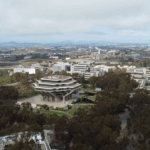Can You Say Brook(en)?
What type of degree prepares students for community organizing? The California-based Saybrook Graduate School and Research Center adds another clue as to the type of training received by community activists of a left-leaning demeanor.
Students with a Saybrook Human Science degree “may design a unique transdisciplinary plan to focus on individual academic and professional goals,” states the school website.
“Graduates have studied such diverse topics as gender and violence; metaphysics and altered states of consciousness; alternative health; popular media and culture; technology; architecture; the meaning of sports; bio-ethics and race; social change among indigenous peoples; community organizing; evaluation of prevention and intervention programs; the way in which religious and therapeutic values impact health care; and physician and patient spirituality” (emphasis added).
The school also apparently encourages students to use the Native American Medicine Circle as a model for understanding social change. Four outlined “learning objectives” for the course “Consciousness and Spiritual Approaches to Social Transformation” were
“1. Develop familiarity with philosophies and practices of nonviolence, Aikido, and the Native American Medicine Circle, and their relationship to social change.
2. Develop a critical understanding of mass media and its construction of spirituality.
3. Develop familiarity and experience with deep ecology perspectives and practices.
4. Be able to apply multiple spiritual perspectives and models to personal meditative and social action practices.”
Saybrook is accredited by the Western Association of Schools and Colleges (WAASC) and offers degrees in psychology, human science, organizational systems, and mind-body medicine. But buyer beware: the course instructors apparently consider empiricism, which posits that all knowledge originates in experience, a “naïve” theory. For the Human Science degree, which offers a concentration in “Transformative Social Change” (TSC) desired “learning outcomes” include “Developing an effective critique of naïve empiricism.” Rather, the instructors prefer that students “Critically analyze both human science and other contemporary modes of inquiry including critical theory, postmodernism, feminism, and multiculturalism.”
Common career choices for the TSC program include, but are not limited to, schools and universities, government, community health centers, alternative health practices, media, the juvenile justice system, social entrepreneurship, and—you guessed it—“community organizing.”
Bethany Stotts is a staff writer at Accuracy in Academia.




